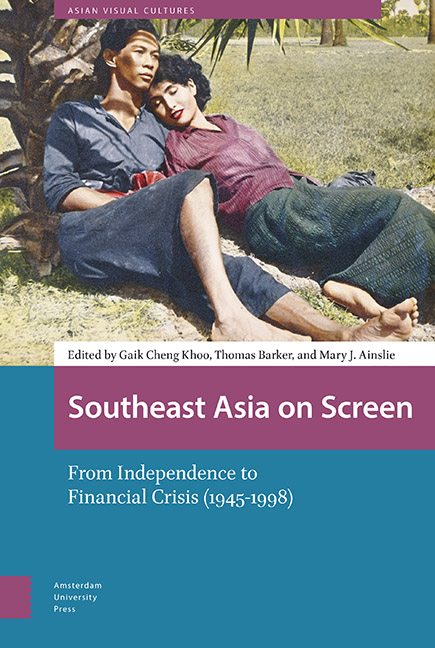Book contents
- Frontmatter
- Contents
- List of Illustrations
- Introduction: Southeast Asia on Screen: From Independence to Financial Crisis (1945–1998)
- Section 1 Independence and Post-World War II Filmmaking: Nation-building, Modernity and Golden Eras
- Section 2 Key Directors
- Section 3 Popular Pleasures
- About the Authors
- Index
13 - The Boonchu Comedy Seriess: Pre-1990s Thai Localism and Modernity
Published online by Cambridge University Press: 20 November 2020
- Frontmatter
- Contents
- List of Illustrations
- Introduction: Southeast Asia on Screen: From Independence to Financial Crisis (1945–1998)
- Section 1 Independence and Post-World War II Filmmaking: Nation-building, Modernity and Golden Eras
- Section 2 Key Directors
- Section 3 Popular Pleasures
- About the Authors
- Index
Summary
Abstract
Research on Thai films after the 1997 economic crash identifies a strong nostalgia for unblemished Thai traditions, ones particularly represented through the countryside and the ideal rural family unit. However, this chapter aims to investigate the comedic Boonchu film series, dating from 1988 to 1996, to address how these films also valorize rural Thailand, a scenario constructed as real ‘Thainess.’ The chapter examines localism, a discourse promoted by the series as a means to undermine modernization, so revealing considerable anxiety around cultural and economic transformation. Nonetheless, the chapter argues that while the series idealizes rural identity as a means to defend Thai cultural values, it also offers a negotiation (rather than a rejection) of various influences of modernity.
Keywords: Thai films, Thainess, localism, Thai cultural values
Thai films are regarded as major indicators of the modernization of twentieth-century Thailand. Prior to 1997, Thai films were mainly produced for a domestic market only, employing a presentational film style that focused upon producing visceral pleasures for local audiences (Ainslie 2017). Often known as the golden age of Thai cinema, this era lasted throughout the 1960s and produced a significant volume of films, deploying a mixture of genre traits such as romance, melodrama, action and comedy. Such films were deeply intertwined with both sociopolitical and cultural contexts; for instance, the 1970 superhero film INSEE THONG (The Golden Eagle, Mitr Chaibancha) depicts a hero similar to that of James Bond or Batman, but who specifically fights against socialism/communism, an ideology regarded as a threat to the country at that particular time. During the political changes of the 1970s, the students’ uprising in October 1973 then led to an interest from filmmakers in social conflict and injustice issues. Films such as Phlae Kao (The Scar, Cherd Songsri, 1977) were released after the 1970s civil conflicts between Thai students and the military, exploring the hardships and the social significance of the poor. In the 1980s, when such political tensions declined, filmmakers moved towards ‘social problem’ films, reflecting the rapid social and economic changes at the rural, regional and national levels. However, it was the recognition of a new urban-based young audience and the corresponding success of a number of teenage films that laid the groundwork for the big budget, technologically savvy and internationally competent film industry which emerged during the late 1990s.
- Type
- Chapter
- Information
- Southeast Asia on ScreenFrom Independence to Financial Crisis (1945–1998), pp. 271 - 290Publisher: Amsterdam University PressPrint publication year: 2020



